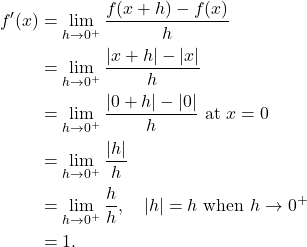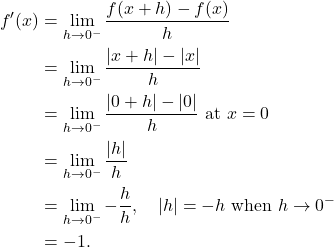Problem 155: Show that the function ![]() is differentiable on
is differentiable on ![]() and on
and on ![]() but has no derivative at
but has no derivative at ![]() .
.
Solution: A function is differentiable if the function has a derivative. That is,
(1) On ![]() ,
, ![]() . Then
. Then ![]() . Therefore, on
. Therefore, on ![]() , the function has derivative -1.
, the function has derivative -1.
(2) On ![]() ,
, ![]() . Then
. Then ![]() . Therefore, on
. Therefore, on ![]() , the function has derivative 1.
, the function has derivative 1.
(3) In order for the function to have a derivative at ![]() , the two sided limits need to agree.
, the two sided limits need to agree.
That is, from the right sided,
(1) 
From the left hand sided,
(2) 
Since ![]() ,
, ![]() do not exist. Hence,
do not exist. Hence, ![]() is not differentiable at
is not differentiable at ![]() .
.

Leave a Reply